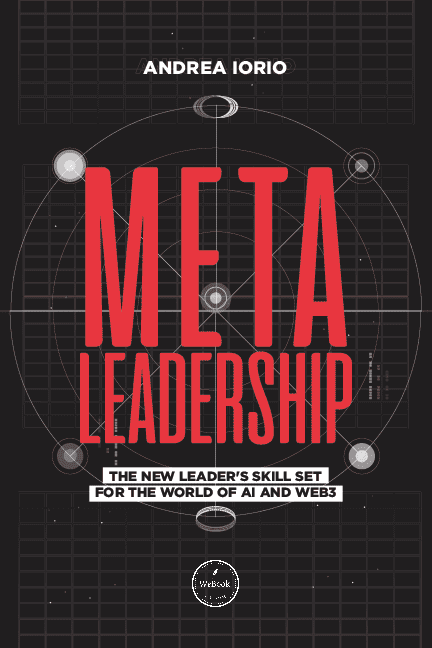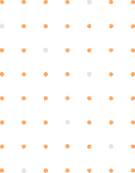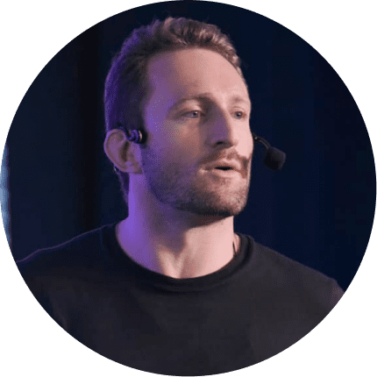What makes a good leader?
What are the key characteristics of good leadership?
How do I become a better leader?
These are some of the questions we have been asking ourselves since the beginning of time about the most important role in society, that of the leader. Whether it's a tribe leader, a political leader, a business leader, or even a family or home leader, as human beings we've always had a tendency to look for figures that could guide us, especially in difficult times, and in which we could put our trust, perhaps to feel less alone, or less lost, or safer too.
And even though these questions are universal, the interesting thing is that the answers to these questions have changed a lot over time. Because let's get into a time machine and a brief historical retrospective, and understand how the history of leadership has changed over time.
Because before we talk about whom I call the Meta-leader", let's better understand the history of leadership and how we got here: in ancient Egypt, leadership came from the endorsement of the Gods and was practically sacred, and in Ancient Rome it was just a slight evolution of this kind of leadership , because it was leadership by blood or through family succession. However, we know well that this style is not a guarantee of good leadership, especially if you know the story of the Roman emperors Nero and Caligula, from the same family and who passed the empire on to each other , where the first set fire to Rome, and the second was so mad that he named his horse the consul. Moving forward, over the following centuries, until the end of the 20th century, the prevailing theory of leadership became the theory of leadership by traits, proposed by Thomas Carlyle: if you are born with some traits like good communication, command and control, extroversion, strength, charisma, and so on, you could be a good leader, if not, my friend, try again.
But the truth is that in the face of empirical evidence that leaders by traits can succeed in some contexts and fail in others (that is, these traits are not universal!), the most recent theory is that of leadership by competencies: that is, it is an adaptable and flexible leadership, which develops new competencies and skills as the external contexts demand it.
You see? It all depends on the context, that is, what we can define as the spirit of the time, or in German Zeitgeist - which fundamentally calls for leadership styles that are updated in the face of the context in which the world finds itself.
Let me make a practical example: if in a pre-digital and analog world, a leader would have to be a great expert of his product or service and could not understand his customer very much, today, in a digital world where the customer is increasingly empowered thanks to technology, he has to know his customer even better than his product and service. At the same time as in today's exponential world, technology changes so quickly that it is more important for a leader to constantly update his knowledge about products and services, than to have a very deep and ingrained knowledge (as is believed to be a very important competency in the pre-digital world). And so on.
And with the advent of Artificial Intelligence, Web3, and the Metaverse, tell me: do you still think today's leadership style that we've inherited from an analog world will work in this third great iteration of the Internet? Obviously not, and that's exactly why we are going to address this topic today.
before we start talking about the "meta-leader" and leadership at Web3, we first have to understand better about Web3, its characteristics, and in particular, how we got here. And that's why I want you to close your eyes, and imagine the following scenario:
imagine that you are walking down the street, walking your dog in the morning, and suddenly you remember a cleaning product that you need to buy urgently, because it has run out. Instantly, a vending machine full of this product appears in front of you, with all its brands, sizes and prices. You look at it, review the options, and choose a product. As soon as you make the payment with your cryptocurrency wallet, the product is already on its way to your home, and you can continue your walk with your dog with no worries at all.
But suddenly, an alert signals that the equipment in the Brazil factory where you work as a maintenance engineer is overheated and in danger of exploding. In a second, the “digital twin” of this equipment appears in front of you, you make some adjustments that are automatically transmitted to the real equipment, which is 5000km away, and you solve the problem immediately.
How could all this be possible, you might be asking yourself?
Well, that will later be possible thanks to the Metaverse, about which a lot is heard but little is understood, right?
So let's understand: what is this Metaverse? The term is born from the union of the Greek prefix "meta" (which means beyond) and "universe", and fundamentally is a shared virtual and collective space, created by the convergence of 2 great spheres:
- on the one hand, virtually enhanced physical reality (through Augmented Reality, like that vending machine in the example),
- on the other hand, the virtual space that duplicates the physical world (represented by the Digital twins, or “Digital Twins”, like the equipment in your factory that we used in the example and which we will talk about).
At the same time, the metaverse has 3 main characteristics:
- is immersive (i.e. it's 3D, not just two-dimensional anymore),
- is persistent (i.e. it exists all the time, regardless of whether it is online or not)
- it is decentralized (that is, there are actually multiple metaverses).
Confused?
Think of it this way: today we are online when we access the Internet, but with new devices, greater connectivity like 5G and advanced technologies, we will be online all the time, so the Internet moment we are experiencing is also defined as Web 3 (a new generation of Internet services to be built on decentralized technologies such as blockchain, Metaverse, tokens (fungible, such as cryptocurrencies), or non-fungible such as NFTs), and decentralized organizations such as DAOs, that is, Decentralized Autonomous Organizations - all generating so much data that the improvement of Artificial Intelligence, which fundamentally acts as a technological layer of this new internet, almost as if it were "the new electricity", follows an exponential trajectory and brings us closer to the moment of the Singularity, which according to Google's engineering director and co-founder from Singularity University Ray Kurzweil, will be the moment when Artificial Intelligence will already be indistinguishable from human intelligence.
But let's follow the evolution of the Web: Web 1.0 arrived with the birth of the Internet and fundamentally digitized information, submitting knowledge to the power of algorithms (this phase came to be dominated by Google), and where you fundamentally consumed content. Web 2.0 arrived with social networks, which work mainly on Smartphones, digitized people too and subjected human behavior and relationships to the power of algorithms (this phase was dominated by Facebook), and where you fundamentally consume content but also create it . What about web 3.0?
This third phase will fundamentally digitize the rest of the world. In Web 3.0, all objects and places will be machine readable and subject to the power of algorithms, and in addition to consuming and creating this content, you will own it. And by whom will it be dominated? Most likely, it will be for anyone and everyone at the same time, being a decentralized web.
In other words, this world of Web3 is bringing such profound changes to business, that the leadership style that brought us here is certainly not the one that will take us forward. Therefore, we need a new leader, what I call the "Meta-leader".
And to better understand how meta-leaders think and act, let's go back to the Zeitgeist concept, and understand what are the universal characteristics of a leader (which for me are linked to the main universal tasks and responsibilities of any leader, of which we will talk about), and put them within the context of Web3. We will identify which are the major changes that Web3 technologies have brought about to leaders, and what are their implications. That's why I'm going to list 5 responsibilities that to me define what a leader needs to do, and how they are conditioned by the current context, or Zeitgeist. Starting with the first great feature of the Web3 world:
- high unpredictability of future trends, due to the exponential rate of change: let's look at the acceleration of technologies today, and how quickly they transform markets and entire sectors of the economy. This is due to the exponential impact of the convergence of new technologies, such as Artificial Intelligence and mobile applications, for example, transforming in banks, from videoconferencing and sensors transforming medical care through telemedicine, and Blockchain allowing smart contracts without the need for intermediaries, and so on. The implication of this exponentiality is that the rate of change in all sectors is getting faster and faster, and this makes leaders have to update our business vision faster and faster - and establishing the VISION is one of the big 5 leader's tasks.
- Infinite capillarity of data: in a world where through the Metaverse and its "digital twins", and where through sensors, wearables, internet of things in enormous volumes (which even make the existence of the Metaverse possible) will generate an infinite volume of data (with a capillarity as deep as monitoring a consumer's pupil dilation), we have to understand that data will become a commodity, and this makes the great challenge for leaders to become that of choosing which are the most important control metrics for your business and its correlations, to make better decisions than your competitors - and DECISION MAKING is one of the 5 great tasks of a leader.
- Need to deal with multiple technologies, multiple metaverses and multiple different identities, of employees and customers: let's look at the decentralization inherent in the world of Web3, where intermediaries will be cut and we will increasingly have direct exposure to customers and various markets. Furthermore, each of these customers will be able to relate to us with multiple identities, in multiple metaverses, bringing an important challenge in terms of new knowledge (about the customer, about markets, about products, and so on), which already requires a leader much more than a specialist, but one that has a varied knowledge, and has the ability to combine technologies, identities and knowledge in a unique way with great mental adaptability - and see that having and obtaining KNOWLEDGE is one of the 5 great tasks of a leader.
- Very low cost of experimentation, and greater possibility of learning from mistakes: think about it, Web3 technologies such as metaverse and Blockchain help us to obtain two things that are fundamental for us to be able to gain agility in the execution of new projects and innovations: on the one hand, it helps us to reduce the cost of experimentation (analyzing the impact of a tree falling on top of your 5G transmission tower is much cheaper through a simulation in the Metaverse than in the real world, isn't it?), while on the other hand it helps us get real-time feedback from this experiment (such as getting real-time sales results through the Blockchain that tracks real-time transactions along your product's supply chain). This all helps us to have more tolerance for errors, as they end up being cheaper and more informative, and consequently helps us to be more agile when executing - and see that INNOVATION management is one of the 5 great tasks of a leader.
- decentralization and autonomy as a fundamental pillar of people management: in a world of the Web3 where smart contracts align incentives between people in a clear and efficient way without the need for intermediaries and hierarchies and even trust (since contracts themselves guarantee trust in "trustless" systems), the need for decentralization, horizontality and autonomy is stronger than ever - to the point that new types of fully horizontal and collaborative organizations were born, also called DAOs, or Decentralized Autonomous Organizations. Faced with these new organizational structures, Web3 leaders can outsource the control of their teams to "smart contracts", and focus on a more autonomous and decentralized management of their teams - and see that PEOPLE MANAGEMENT is one of the 5 great tasks of a leader.
Due to these 5 profound changes that Web3 and its technologies have brought to leaders along their 5 main axes of responsibilities, we need a new style of leader that develops a new range of skills to react to them. And this is where the Meta-leader is born, for which I propose a leadership model based on the pillars below:
- RePerception as a radar to navigate the uncertain future of Web3;
- Cognitive flexibility to deal with infinite variables and fields of knowledge;
- Analytical culture to deal with infinite capillarity of data
- Anti-fragility to maximize experimentation and learning from mistakes;
- Extreme autonomy and "trustless" systems for people management.
And it’s about this and much more that we are going to talk about over the next articles. Stay tuned!
Keywords Digital Transformation: Meta Leader, Meta Leadership, Machine Learning, Big Pharma, Novartis, Janssen, AstraZeneca, Abbott, Roche, Supply Chain, DLT, Pfizer, Amgen, Gilead, Facebook, Metaverse, Web 3, Web 3.0, Web 101, Bitcoin, BTC, Cryptocurrency, NFTS, 5G, Digital Twins, DAOS, Blockchain, Big Data, ReD, AI, AR, RPA, BASF, CX, B2B, Open Innovation, Andrea Iorio, Leadership, Web 3, Business, What is Digital Transformation, Business Transformation, Defining Digital Transformation, Digital Transformation Company, Digital Transformation Strategy, Technology Transformation, What Does Digital Transformation Mean









